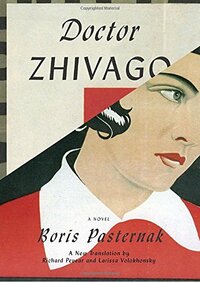Take a photo of a barcode or cover
I went into this book expecting to love it. Shostakovich is wonderful and he and Pasternak were living in the same time and place, and Shosty wrote the music to the 1971 version of King Lear, and Pasternak translated the Shakespeare to Russian, but Shosty's music is beautiful, and full of meaning, where as Pasternak's writing is full of meaning, but the beauty comes from far and few between as beautiful diamonds of quotes that get your hopes up that the writing will get better, only to have the next twenty or forty pages be as dull as the last twenty or forty that came before.
And on another note, I am very frustrated by the Wikipedia description of Lara and Komarovsky's relationship as 'an affair.' That they were relieved that Lara's mother hadn't learned of their 'affair.' Komarovsky was Lara's mother's boyfriend. If such a relationship happened in todays society it would be called sexual abuse, and I feel that in descriptions and analysis of the book it should be called that as well.
Spoiler
And did Lara marry Komarovsky in the end? I was hoping that her daughter only believed that her mother was married to him because they had been traveling together. I cannot imagine that Lara would have willingly married the man who abused her for so long.I am currently nearing the end of my journey which I call "Summer of Russian Classics", which means that I was required to read seven specific Russian classics for a lecture I was required to take as part of my major in Slavonic Studies. One of which was Doctor Zhivago. Despite having had planned to write reviews on all of them at one point, finishing Doctor Zhivago made it quite clear to me, that I had to write that one as soon as possible. Not only because it took me the longest to complete, but because I felt like I could only do my feelings justice as long as they were still fairly fresh. I also want to mention that I haven't seen the movie and went into this completely blind. (mild spoilers included)
To start this off, I had just finished Fathers and Sons by Turgenev, which I had found quite easy to read. Had I changed my reading order a bit, I might have found it easier to get into the writing style and wouldn't have taken as long. One of the main reason for that were the change of names Pasternak seems to be notorious for. To give you an example: Imagine someone continuously referring to someone by their last name, then suddenly, after weeks of not mentioning said person, referring to that person by their first name, then switching to a nickname. That's kind of what it was like for me. You get used to it of course and using a diagram was very useful for me, but it did lead to a lot of confusion sometimes. Some characters appeared midway through the book, then vanished for several chapters, then reappeared one by one and hadn't I written their names and details down earlier, I wouldn't have remembered them at all.
Doctor Zhivago tells the story of Yuri Zhivago, who is raised by his uncle and later becomes a doctor and marries his childhood friend Tonya, not quite out of passion. He later finds himself attracted to another woman called Lara, who is married to Pasha who is believed to have died in the war, who haunts him until the very end. During his lifetime Yuri is faced with serving in World War I, poverty, the Russian Revolution and his own struggles with morals, love, his passion for writing and the future. The story is very character-focused and driven by the historical events of the 19th century. It begins with the funeral of Yuris mother and follows his story until his death.
What fascinated me personally about the style Pasternak used, were the little dialogs and all the narration that gave an insight into (mostly but not only) the central protagonist Yuri Zhivago and still managed to tie me in. Pasternaks descriptions were truly wonderful at times. For a very long time I wasn't sure how I honestly felt about him. A lot of the characters were quite bland, but that was mostly due to them being absent most of the time. I also questioned if I had somehow missed the story, the ultimate meaning I was looking for. Only towards the end did I realize it wasn't really about that and that's when I made up my mind about Yuri, his character and his fate.
This actually leads me to one of my favorite parts of this book: Yuri returns to Warykino, he reconnects with Lara and loses himself in his writing. When Lara leaves never to return, Pasha and Yuri meet by coincidence and have a final conversation. Both are now immersed in their loneliness and something inside of me just clicked. It made me realize how much had changed since the beginning of the book, how much Yuri and Pasha had changed or had to change. I can't exactly explain why, but that part transformed me into an emotional mess until the very last page. Especially the following exchange between Pasha and Yuri really left an impression on me:
"[...] And all the time they, she and my daughter, were next door, they were here! What an effort it cost me to resist the longing to rush to them, to see them! But I wanted to finish my life's work first. Oh, what wouldn't I give now for one look at them! When she came in it was as if the window flew open and the room filled with air and light."
"I know how much you loved her. But forgive me, have you any idea of her love for you?"
"Sorry. What was that you said?"
"I asked you, had you any idea of how much she loved you —more than anyone in the world?"
"What makes you say that?"
"Because she told me so herself."
I wouldn't have expected Yuri to say something like that, but it made sense. There was a weird form of understanding between the two men, both separated from the woman they both loved. And while it had been a bit harder for me to read Lara at first, I found it fascinating that those relationships turned out the way they did. They had both had their own experiences with her, yet neither of them was the "winner" or to be clear, the one who ended up sticking with her. Pasha had disappeared a long time ago, never to return, now it had been Yuri's turn to disappear. It stroke me as quite a parallel, which I would relate to the candle.
During the first half of the book, Pasha and Lara have a talk and Lara asks him to turn off the light and light a candle instead - she feels more comfortable that way.
"She liked to sit in the dim light of candles, and Pasha always kept a few spare ones. He replaced the stump in the candlestick with a new candle, put it on the window sill, and lit it."
The same night Yuri spots a candle in a window, which to him seems like it's expecting someone and about which he ends up writing his poem "Winter Night".
"A candle burned on the table, a candle burned…," he whispered to himself—the beginning of something confused, formless; he hoped that it would take shape of itself. But nothing more came to him."
Lara also ends up referring to her talk with Pasha and the candle on Yuri's death bed and how he hadn't crossed her path yet back then. When I think about Lara, Yuri and Pasha, I see that candle burning on the window sill.
The book started with most of the characters at quite a young age and you see them transform as they go through their own struggles with Soviet life. The reader hadn't encountered Pasha for numerous chapters, which in context of the book meant years and for me it was hard to see what he had become, but how there was still that young man deep inside of him. The same applies to Yuri, except I hadn't realized, because he was just there all the time, because his transition had seemed so natural to me. As if I had had this friend for years, then looked back on how he had been when we met, and suddenly recognized all these changes. He went from this young man who enjoyed political discussions and enjoyed the thought of revolution to quite the opposite.
When reading books I'm usually very fascinated by characters, their transitions and personal struggles. Therefore, despite it not being an easy read, Doctor Zhivago really managed to make me think, which I had never thought possible when I first started reading this book. I actually caught myself randomly thinking about it a lot after I was done. It wouldn't leave my mind and I dare to say that's a good sign when it comes to reading. I especially kept questioning how I would have reacted had I been in Yuris situation, especially when it comes to his struggle with writing and his own individuality that he desperately tried to express during a time when doing so was nearly impossible, and of course his fear of loneliness and his confusion with his love life. Whether you like Yuri or not, I think you can appreciate how human he is and feels.
Looking back, following Yuri throughout his lifetime was a very personal experience for me and definitely made an impact on me. Due to the reading issues I've had that often made this book less than an enjoyable read, I can't make myself rate it 5 stars. It was hard to follow Yuris long, long strains of thoughts sometimes, which sometimes required me to re-read longer passages and left me frustrated. This then left the impression that the story was moving painfully slow. Therefore I've decided to give it 4/5 stars and leave it at that.



